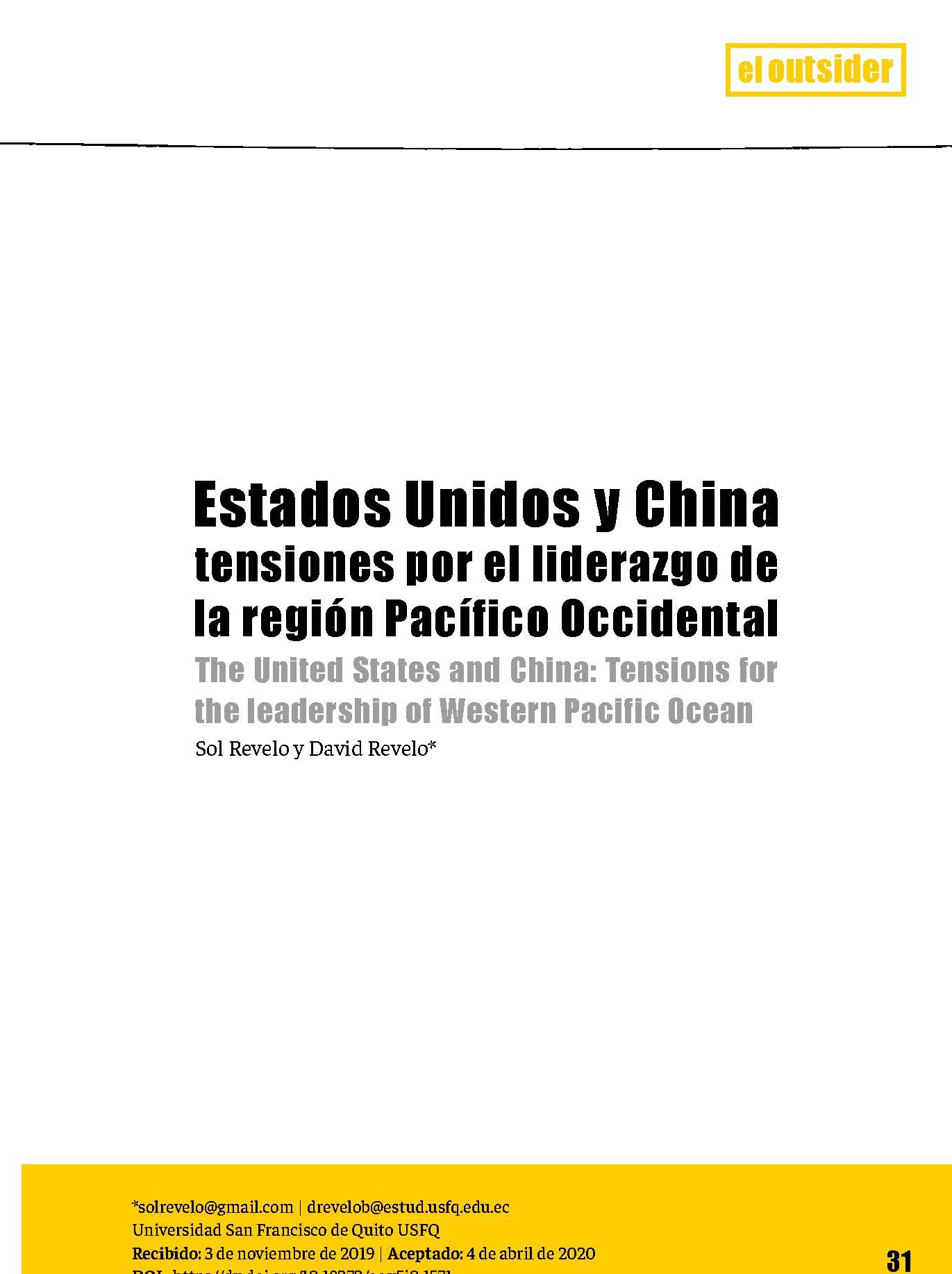The United States and China: Tensions for the leadership of Western Pacific Ocean
Main Article Content
Abstract
In recent years, the Western Pacific region has been the field of great tensions between states in the area. These tensions have mainly occurred due to territorial disputes in the South China Sea. Specifically, the territorial claims of the People's Republic of China to lead in the South China Sea have challenged the leadership of the United States in the Western Pacific region. This article analyzes the power dynamics in the Western Pacific region and the strategies that the People's Republic of China has used to lead this area.
Article Details
References
Allison, Graham. 2016. "Of Course China, Like All Great Powers, Will Ignore an International Legal Verdict." The Diplomat, July 11, 2016. https://learn.bu.edu/bbcswebdav/pid-7198127-dt-content-rid-31552999_1/courses/19fallcasir373_a1/Allison2016.pdf
American Institute in Taiwan. 2019. “Taiwan Relations Act (Public Law 96-8, 22 U.S.C. 3301 et seq.).” Recuperado noviembre 1, 2019. https://www.ait.org.tw/our-relationship/policy-history/key-u-s-foreign-policy-documents-region/taiwan-relations-act/
Arana, Ismael. 2015. “Las cinco claves de la disputa territorial por el mar de China Meridional.” El Mundo, octubre 27, 2015. https://www.elmundo.es/internacional/2015/10/27/562f84e746163f59648b4689.html
Asia Maritime Transparency Initiative. 2017. “A Constructive Year for Chinese Base Building.” Center for Strategic and International Studies. Recuperado noviembre 1, 2019. https://amti.csis.org/constructive-year-chinese-building/
Asia Maritime Transparency Initiative. 2019. “South China Sea Energy Exploration and Development.” Center for Strategic and International Studies. Recuperado noviembre 1, 2019. https://amti.csis.org/south-china-sea-energy-exploration-and-development/
Black, Ben. 2018. “The South China Sea Disputes: A clash of international law and historical claims.” Journal of Law and International Affairs, marzo 22, 2018. https://sites.psu.edu/jlia/the-south-china-sea-disputes-a-clash-of-international-law-and-historical-claims/
China Power Project. 2019. “How much trade transits the South China Sea?” Center for Strategic and International Studies. Recuperado noviembre 1, 2019. https://chinapower.csis.org/much-trade-transits-south-china-sea/
Congressional Research Service. 2018. The Asia Pacific: Challenges and Opportunities for U.S. Policy, por Emma Chanlett-Avery, K. Alan Kronstadt, Susan V. Lawrence and Mark E. Manyin. Recuperado noviembre 1, 2019. https://fas.org/sgp/crs/row/IF11047.pdf
Council on Foreign Relations. 2019. “U.S. Relations with China” Recuperado noviembre 1, 2019. https://www.cfr.org/timeline/us-relations-china
Cox, Michael y Doug Strokes. 2012. U.S. Foreign Policy (2nd edition). Oxford: Oxford University Press
Department of State. 2019. “The Chinese Revolution of 1949”. Recuperado noviembre 1, 2019. https://history.state.gov/milestones/1945-1952/chinese-rev
Desjardins, Jeff. (2019). “Chart: The World’s Largest 10 Economies in 2030.” Visual Capitalist, enero 11, 2019. https://www.visualcapitalist.com/worlds-largest-10-economies-2030/
Fravel, Taylor. 2011. “China's Strategy in the South China Sea.” Contemporary Southeast Asia: A Journal of International and Strategic Affairs 33 (3):292-319. 10.1353/csa.2011.0136
Hartman, Leigh. 2019. “The importance of the South China Sea.” Share America, Julio 11, 2019. https://share.america.gov/importance-of-south-china-sea/
Hook, Steven, and John Spanier. 2017. American Foreign Policy Since World War II (20th Edition). Los Angeles: CQ Press
Kazianis, Harry. 2013. “China’s Expanding Cabbage Strategy.” The Diplomat, octubre 29, 2013. https://thediplomat.com/2013/10/chinas-expanding-cabbage-strategy/
Kim, Jihyun. "Territorial Disputes in the South China Sea: Implications for Security in Asia and Beyond." Strategic Studies Quarterly 9, no. 2 (2015): 107-41. http://www.jstor.org/stable/26271078.
Lyons, Kate. 2019a. “China extends influence in Pacific as Solomon Islands break with Taiwan.” The Guardian, septiembre 16, 2019. https://www.theguardian.com/world/2019/sep/16/china-extends-influence-in-pacific-as-solomon-islands-break-with-taiwan
____. 2019b. “Taiwan loses second ally in a week as Kiribati switches to China” The Guardian, septiembre 20, 2019. https://www.theguardian.com/world/2019/sep/20/taiwan-loses-secsond-ally-in-a-week-as-kiribati-switches-to-china
Organización de las Naciones Unidas. 1982. “Convención de las Naciones Unidas sobre el Derecho del Mar”. Recuperado noviembre 1, 2019. https://www.un.org/Depts/los/convention_agreements/texts/unclos/convemar_es.pdf
Santoro, David. 2019. “Beijing’s South China Sea Aggression Is a Warning to Taiwan.” Foreign Policy, septiembre 16, 2019. https://foreignpolicy.com/2019/09/16/beijings-south-china-sea-aggression-is-a-warning-to-taiwan/
Stashwick, Steven. 2019. “China’s South China Sea Militarization Has Peaked.” Foreign Policy, agosto 19, 2019. https://foreignpolicy.com/2019/08/19/chinas-south-china-sea-militarization-has-peaked/
The White House. 2017. National Security Strategy of the United States of America. Por The White House. Washington DC. 2017

